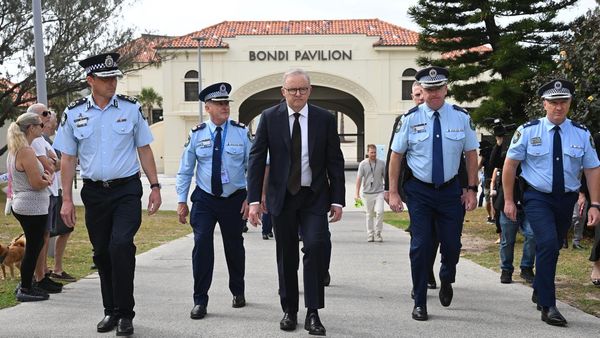
The Chinese foreign minister, Wang Yi, has urged his Australian counterpart, Penny Wong, to treat China as a partner, accusing previous governments of treating it as an opponent or threat.
On the sidelines of the G20 foreign ministers meeting in Bali on Friday, Wang expressed hope that Australia could “seize the opportunity, take concrete actions and come to a correct understanding of China” and accumulate “positive energy” towards it, according to a summary published late on Saturday by China’s foreign ministry.
“The root cause of the difficulties in Chinese and Australian relations in recent years lies in the insistence of previous Australian governments to treat China as an ‘opponent’ and even a ‘threat’,” Wang said, adding that Australia’s words and actions had been “irresponsible”.
Among Beijing’s grievances were the Morrison government’s call for a full investigation into the origins of Covid-19, the Turnbull government’s package of foreign interference laws perceived to target China, and the ban on China’s Huawei from participating in Australia’s 5G rollout.
Since the Albanese government was elected in May, Australia and China have reopened lines of communication including the deputy prime minister, Richard Marles, meeting China’s defence minister in Singapore in June.
Wang met Wong on Friday, the first face-to-face meeting between the two countries’ foreign ministers since 2019, which Wong labelled a “first step towards stabilising the relationship”.
Australia has complained about China’s trade sanctions against a range of exports including meat, crayfish, timber and coal and is pursuing trade disputes in the WTO over anti-dumping tariffs on Australian wine and barley.
On Wednesday, Australia’s trade minister, Don Farrell, suggested a “compromise situation” or “alternative way” to settle trade disputes might emerge in talks between the two countries.
But after the foreign ministers’ meeting, Wong warned Australia will continue to push for an end to Beijing’s “coercive” trade sanctions and would not recoil from any domestic policy decisions taken “on the basis of our national interest, our security and our sovereignty”.
In the meeting, Wong raised the ongoing detention of the Australian journalist Cheng Lei, who is an anchor for the Chinese state-owned, English-language news channel China Global Television Network, and the plight of the Australian writer Dr Yang Hengjun, who has been detained by Chinese authorities since early 2019.
Australia has also expressed concern about China’s growing presence in the Pacific region, with the prime minister, Anthony Albanese, warning on Friday that Beijing had become “more aggressive”.
During Australia’s recent federal election, China and Solomon Islands announced a new security pact which Labor labelled the worst Australian foreign policy failure in the Pacific in decades.
Wang told Wong at the Friday meeting that China was conducting “equal exchange and cooperation” with sovereign island nations based on their requests and needs, the Chinese foreign ministry said.
On Sunday Australia’s minister for international development and the Pacific, Pat Conroy, said that a meeting of Pacific foreign ministers last week had agreed to look to “our own region first before looking at any outside partners”.
China is “very interested at increasing their presence in the region, as is the US, UK, France, India”, Conroy told Sky News, but the “consensus was to look at the region first for our security needs, and only look outside if they cannot be met from within the region”.
The shadow foreign affairs minister, Simon Birmingham, said the test for Labor’s attempted reset with China was not “in the having of a meeting, but in the outcome of the meetings”.
Birmingham told Sky News the Albanese government should be judged by removal of trade sanctions and treatment of “unfairly detained” Australian citizens.
“China made the decision, previously, that they were unwilling to have ministerial level meetings with the democratically elected government of Australia – that was counterproductive … Now they have resumed those meetings, that’s welcome,” Birmingham said.
He said he was “very concerned” about Farrell’s reference to possible “compromise” with China. “There’s no room for compromise – we shouldn’t be trying to shove one Australian industry under a bus to get movement on some other,” Birmingham said.







